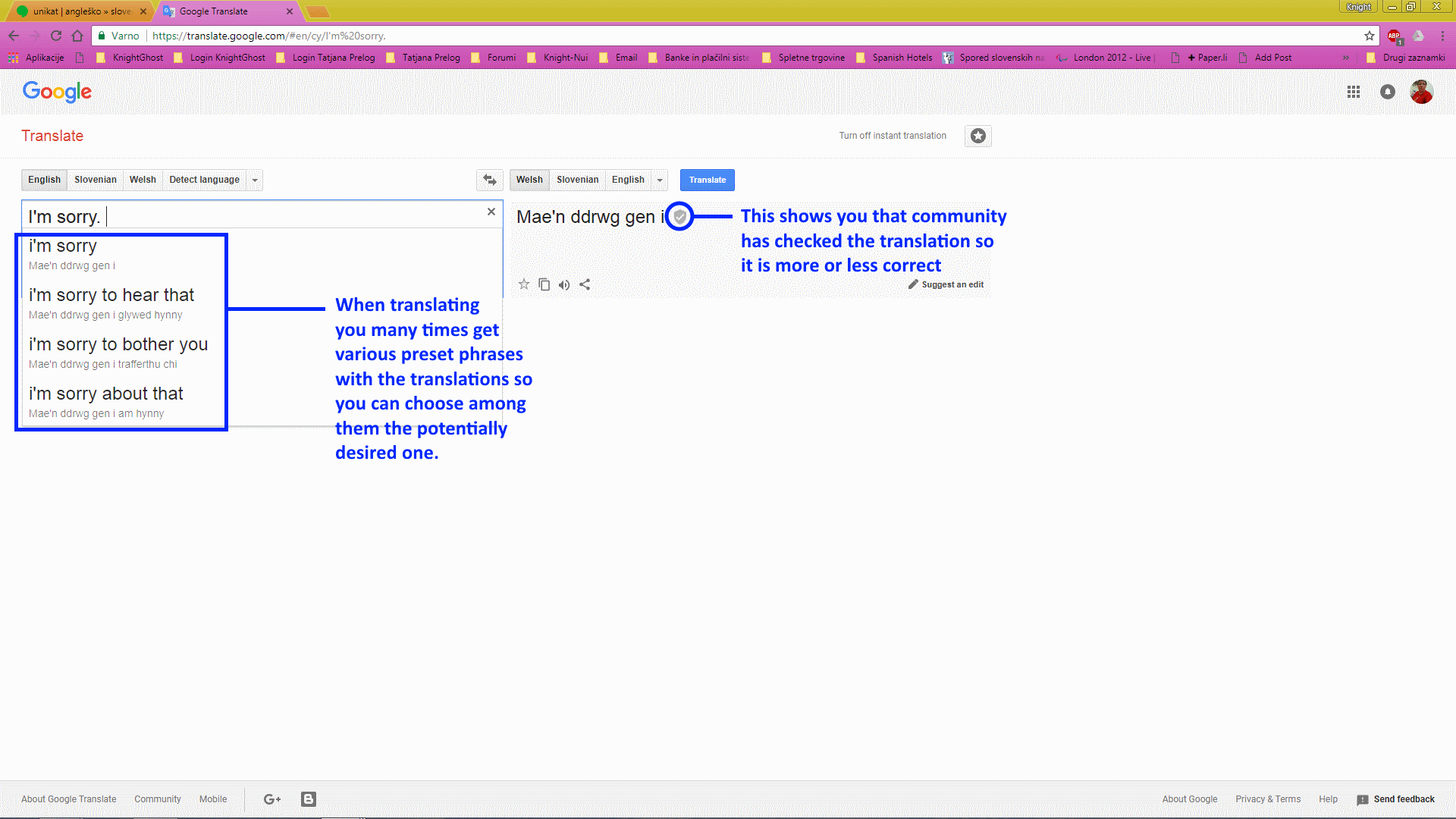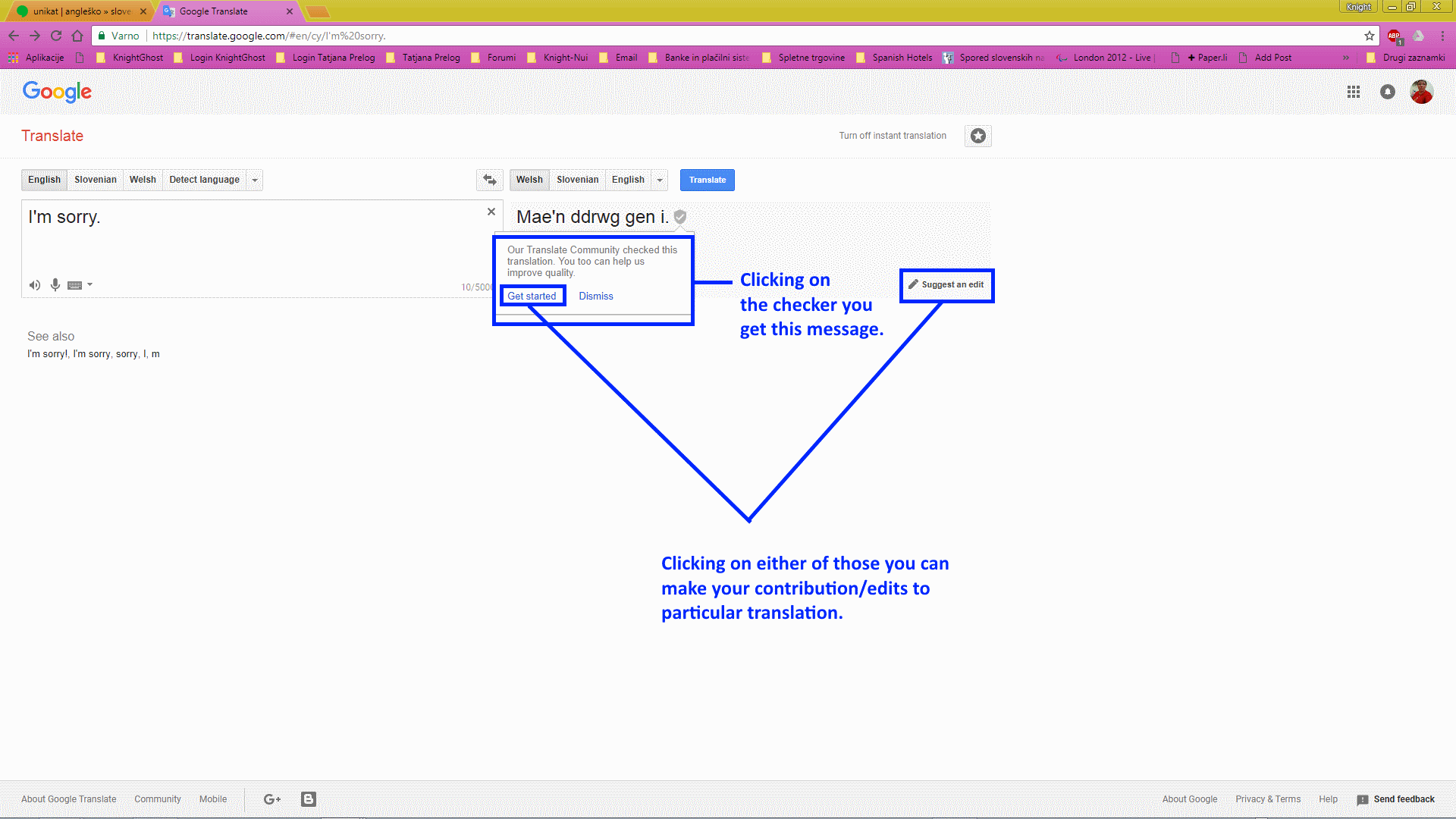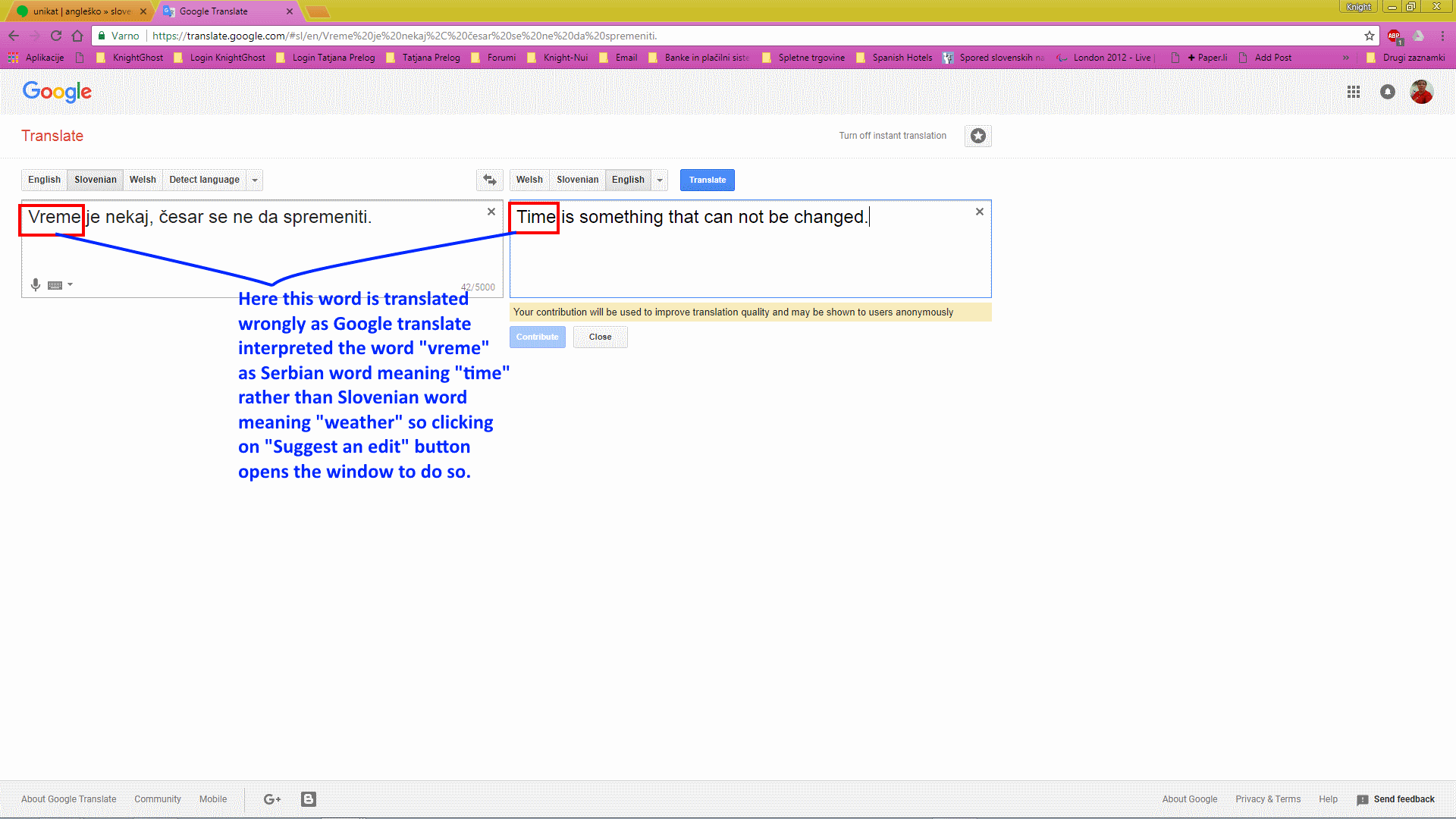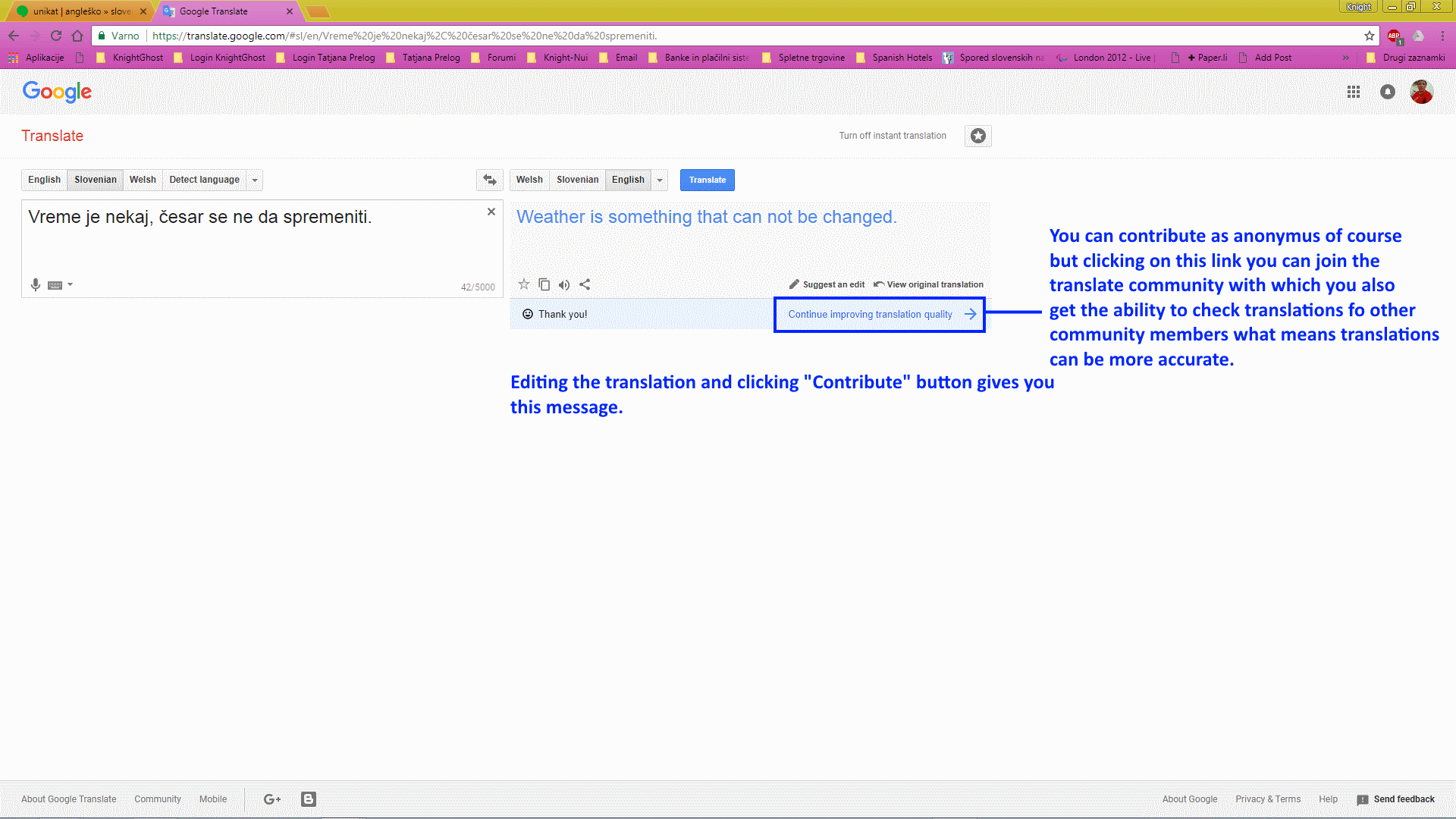I am also using DuoLingo to learn Welsh as well as SSI and sometimes “cheat” by using Google translate. There are often big differences in translation. Today”I got “Fi sy biau hi”. Duo Lingo said this means “It’s mine” but Google Translate said “I’m sorry”. Can anyone explain???
Also - does anyone know of any really GOOD iPhone translation apps for Welsh? I’ve tried some and they don’t even get the basics right like “I am Neville”…
The best/only explanation is that Google translate is very unreliable!
Hopefully someone who uses other translation apps will be able to help you with the second bit - I don’t use any, sorry.
Google translate, must be mixing up biau with bai - what you wrote isn’t a million miles away from “I’m to blame for it - Fi sy ar bai …”, which is a bit like sorry.
Google translate, looks for patterns in it’s database of books and all the on-line stuff it finds etc and finds the best match - it doesn’t do a word for word translation as you might expect.
Ditto about Google Translate being unreliable. I’ve just been playing around with it:- putting biau on its own, identifying Welsh (instead of allowing it to guess) and asking for the English resulted in “Yes” being offered (which is incorrect of course) , but it ignored biau in the sentence you were talking about earlier…
I use Geiriadur.net as a dictionary. I love the capability of asking about idiomatic phrases, but I tend to stick to SSiW, S4C, Radio Cymru and myself to make progress.
Good luck!
I think “Fi sy ar bai” is more akin to “Its my fault”.
You can also say “Bai fi…”
Isn’t “It’s my fault” and “I’m to blame” the same thing?
Someone from my place of work once got an e-mail in Welsh. My colleague thought it’d be a good idea to copy it and paste it into Google translate, work out what was being asked, compose a reply in English, use Google translate to make it Welsh and then send that as a reply. Needless to say, the customer was not too happy and was bemused as to why they were being asked about their dog’s heartburn or something!
Google translate is brilliant for giving you the gist of a piece of text written in a language you don’t understand. I use it a lot in my role as moderator on a gamified productivity site. People will sometimes flag messages in a foreign language and Google translate is accurate enough to tell me whether the message did say something offensive or whether the person flagging had confused the +1 (I approve of this message!) with the flag to report something amiss, which is a common mistake amongst non-English speakers.
Google translate is not, however, necessarily accurate, especially with short phrases. And trying to do it the opposite, that is translating from one’s native language into another is just asking for trouble! 
Yes, I should really have added :- but it’s not really like “sorry” and that’s the point I was trying to make, that it sounded like you were linking the two, almost trying to understand the mistake that was made and almost trying to justify it… I may have misunderstood your motive, sorry…
No, I’m the one who misinterprated - I was trying to say that “it’s my fault” is apologetic, just like “I’m sorry” and the way that Google translate works, it’s quite possible for it to get things like that mixed up in that way, because it doesn’t do translations in the classic way and this is the type of error it can and does make from time to time (well quite frequently).
So we do agree that Google Translate is not the best tool for idiomatic language…
We all see things in a unique fashion and I’m guilty of assuming others will see things the way I do… and although I know this, I haven’t trained myself to recognise when I’m doing that 
fi sy ar bai, felly paid becso dim
Well, I actually never heard that expression before. For I’m sorry I always use “Mae’n drwg da fi”.
About Google Translate I agree with all of you however if you use it right it can be of great help. And something else: we many times forget that we can contribute to the translations with our own edits of particular translation. Well, I’ve edited things for Slovene many times however, to be honest, I rearly went back to check things if they were really acuired into the database. You can also see that some translations are marked with checker similar to veryfied acounts on Facebook and Twitter and if you click those checkers you can see that they mean the translations were checked by the community and this for they should be correct.
Well as always, this little tutorial is not aimed to patronize anyone it’s just to get you aware that Google Translate offers the possibility to make trnslations better in any language you’re skilled enough to contribute. So, my suggestion is, if you see the wrong translation, go and edit it instead of complaining upon the Google Translate, so that the next time the tranlation might be correct or at least more right than it is at the time.
I just wanted to pass on a useful tip about using Google to check translations. I don’t mean Google translate, I mean the main Google search.
If you have thought up a phrase and you’re not sure whether it’s correct, try putting it into the Google search box and see what comes up. The search phrase should be highlighted. Tip: You may need to put the phrase within quote marks to make Google search just on the phrase rather than the individual words.
If lots of page show up from sites that you know should be written in correct Welsh, you can be pretty confident the phrase is OK. If all that comes up are a few badly spelled blog posts, you know it’s not right.
For example, I wanted to end an email with the phrase I often use in English, “let me know if you need any more information.” As I needed to be more formal, I came up with “gadewch i mi wybod”, but wasn’t sure whether a literal translation from English was acceptable. Putting it into Google showed lots of examples, so I decided it was OK to use.
Nice work Tatjana! I have offered “corrections” to SatNav programs in the same way, it’s quite off-putting to find the roundabout you were looking for has turned into a junction, or vice versa!!
Yes, agree on this.
Interestingly, when I tried this to check I’d got the right word for “router” (the modem-thing that allows me to watch S4C, llwybrydd) I managed to come across a page from a Chinese woodworking-tools manufacturer about routers (a cross between a chisel and a drill, I haven’t been able to find a Welsh translation) who appeared (at a guess) to have just poured an English version through Google Translate. I’ll see if I can find it again…
(searches)
Wow! I can’t find the same one, I’ve found loads of them. Clearly, Chinese companies trying to sell woodworking-tools in Welsh is a thing. I’m starting to wonder if any of those pages are actually kosher Welsh - but I still doubt it!
That’s one of the more bizarre things I’ve seen!.. 
The carpentry router is a plaen cafnu (plural = plaeniau cafnu) ![]()




